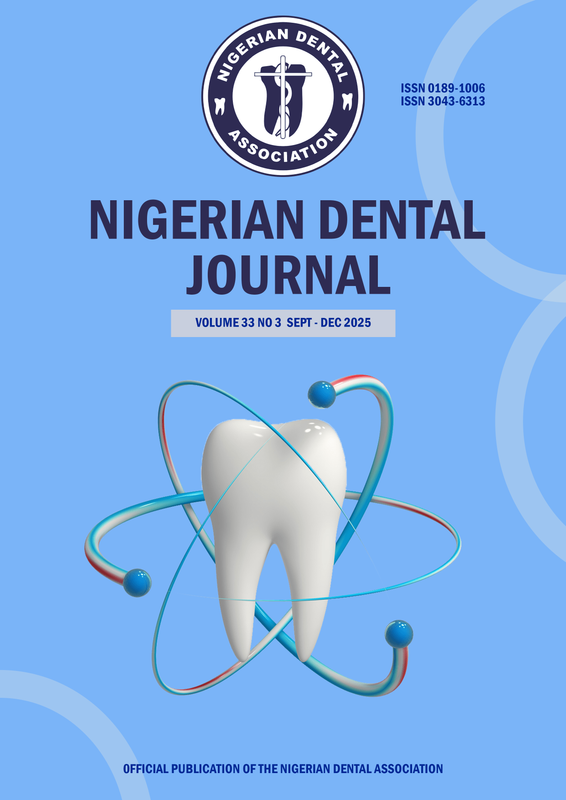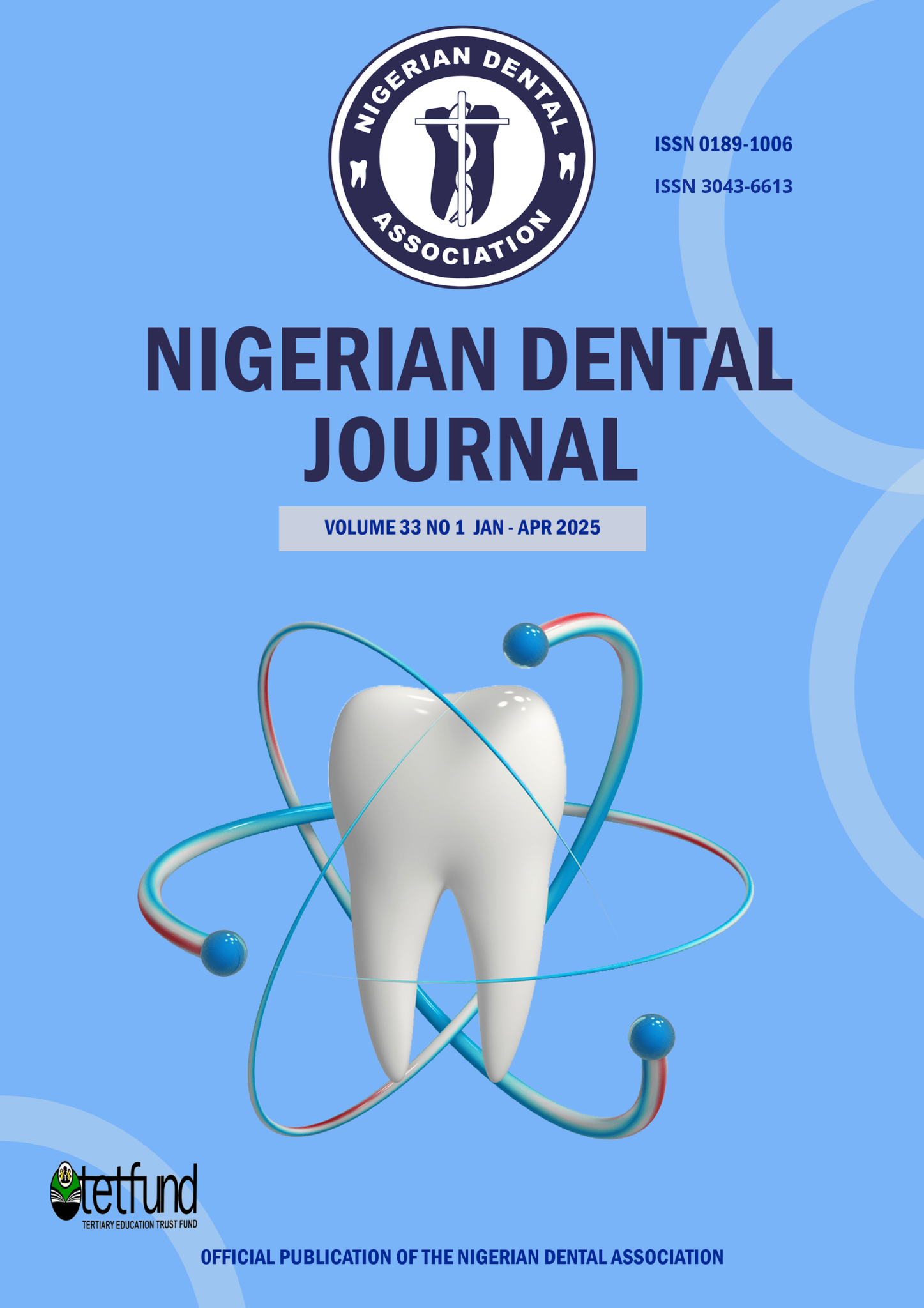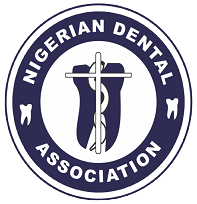Challenges Experienced and Coping Mechanisms of Internally Migrated Informal Caregivers of Patients With Orofacial Diseases Attending the University College Hospital, Ibadan
DOI:
https://doi.org/10.61172/38cd8n11Abstract
Introduction- Certain illness may require long-term from specialists, often located in teaching hospitals in developing countries. This may involve internally migrating informal caregivers (IMICS) accompanying patients to tertiary health institutions. Little is known about the difficulties encountered by informal carers of patients with orofacial diseases in sub-Saharan Africa, specifically Nigeria. This study explores the lived experiences of internally migrated informal caregivers of patients with orofacial diseases at the University College Hospital, Ibadan, Nigeria, regarding the hurdles they encountered and the coping strayegies they employed.
Materials and Methods: This qualitative study which utilized phenomenological inquiry was conducted among internally migrated informal caregivers of patients with orofacial diseases at the University College Hospital, Ibadan.
Data was collected through face-to-face in-depth interviews,which were audiotaped and later transcribed. A total of 18 internally migrated informal caregivers were interviewed for the study. Interviews were stopped when the participants responses were the same signifying saturation. The data was analyzed using thematic analysis.
Result: Thirteen (72.2%) of the caregivers were female and 14 (77.8%) of the respondents were married. Fifteen (83.3%) of the IMICs were employed , while (16.7%) were undergraduate students. Informal caregivers who relocated internally spent 5-10 nights with their patients in the facility, facing emotional,health, financial,tran sportation, and institutional challenges, along with poor attitude and responsiveness from health workers.
Coping mechanisms included socializing with other IMICs, being religious, engaging with media, finding the hospital staff friendly and having a support system.
Downloads
References
1 Welcome M. The Nigerian health care system: Need for integrating adequate medical intelligence and surveillance systems J. Pharm. Bioallied Sci., 2011; 3;470–478
2 Ajao H. Oral Health Workforce Planning in Nigeria Otolaryngology. Head Neck Surg. 2018; 4;1–6
3 Kent EE, Rowland JH, Northouse L, Litzelman K, Chou WYS, Shelburne N, Timura C, O’Mara A, Huss K. Caring for caregivers and patients: Research and clinical priorities for informal cancer caregiving Cancer. 2016;122;1987–1995
4 Gabriel IO. Caregiver Burden Among Informal Caregivers of Women with Breast Cancer Biomed. J. Sci. Tech. Res. 2019;3;1-9
5 Karimi MZ, Rostami M, Zeraatchi A, Mohammadi BJ, Saed O, Zenozian S. Caregiving burden, depression, and anxiety among family caregivers of patients with cancer: An investigation of patient and caregiver factors Front. Psychol. 2023;14;1059605
6 National Cancer Institute (NCI), https://www.nih.gov/about-nih/what-we-do/nih-almanac/national-cancer-institute-nci. (accessed 10 November 2022)
7 Sercekus P, Besen DB, Gunusen NP, Edeer AD. Experiences of Family Caregivers of Cancer Patients Receiving Chemotherapy Asian Pac. J. Cancer Prev. 2014;15;5063–5069
8 Chukwu N, Agwu P, Ajibo H and Aronu N. Challenges faced by informal caregivers of patients in a Nigerian hospital and implications for social work J. Soc. Work, 2022;22;1189–1206
9 Saunders B, Sim J, Kingstone T, Baker S, Waterfield J, Bartlam B, Burroughs H, Jinks C. Saturation in qualitative research: exploring its conceptualization and operationalization Qual. Quant. 2018;52;1893–1907
10 Burnard, P., Gill, P., Stewart, K., Treasure, E., & Chadwick, B. (2008). Analyzing and presenting qualitative data. British Dental Journal, 204(8), 429-32
11 Neubauer BE, Witkop CT, Varpio L. How phenomenology can help us learn from the experiences of others Perspect. Med. Educ. 2019;8;90–97
12 Caelli K. Engaging with Phenomenology: Is it more of a Challenge than it Needs to be? Qual. Health Res., 2001;11;273–281
13 Navaie-Waliser M, Spriggs A, Feldman PH. Informal Caregiving: Differential Experiences by Gender Med. Care. 2002;40;1249
14 Revenson TA, Griva K, Luszczynska A, Morrison V, Panagopoulou E, Vilchinsky N, Hagedoorn M, in Caregiving in the Illness Context, eds. RevensonTA, Griva K, Luszczynska A, Morrison V, Panagopoulou E, Vilchinsky N, Hagedoorn M. Gender and Caregiving: The Costs of Caregiving for Women Palgrave Macmillan UK, London. 2016; pp. 48–63.
15 N. Sharma N, Chakrabarti S, Grover S. Gender differences in caregiving among family - caregivers of people with mental illnesses World J. Psychiatry. 2016;6;7–17
16 Informal Caregiver Supply and Demographic Changes, https://aspe.hhs.gov/reports/informal-caregiver-supply-demographic-changes-review-literature-0, (accessed 4 March 2024).
17 Gbolahan OO, Olowookere SA, Aladelusi TO, Olusanya AA, Fasola AO, Akinmoladun VI, Okoje VN, Arotiba JT. Burdens and predictors of the Burden experienced by Family Caregivers of Patients with Oral and Maxillofacial Tumours J. West Afr. Coll. Surg. 2021;11; 18–25
18 Adebayo K. Challenges Facing Relatives of Hospitalized Patients in Nigeria, https://cartafrica.org/challenges-facing-relatives-of-hospitalised-patients-in-nigeria/, (accessed 20 November 2023).
19 Effendy C, Vernooij-Dassen M, Setiyarini S, Kristanti MS, Tejawinata S, Vissers K. Engels Y. Family caregivers' involvement in caring for a hospitalized patient with cancer and their quality of life in a country with strong family bonds: Family caregivers' involvement in caring and their quality of life Psychooncology., 2015;24;585–591
20 Hu C, Kung S, Rummans TA, Clark MM, Lapid MI. Reducing caregiver stress with internet-based interventions: a systematic review of open-label and randomized controlled trials J. Am. Med. Inform. Assoc. JAMIA, 2015;22;e194-209
Downloads
Published
Issue
Section
License
Copyright (c) 2025 Mariyam Salako, Tunde Ojerinde, Folake Lawal

This work is licensed under a Creative Commons Attribution 4.0 International License.
Open Access Statement
- We became fully Open Access since January 2023.
- Our new and archived materials are available free of charge on open basis and under a Creative Commons license as stated below.
Copyright statement
Copyright © 1999 The authors. This work, Nigerian Dental Journal by Nigerian Dental Association is licensed under Creative Commons Attribution 4.0 International License.


